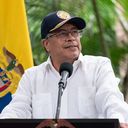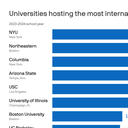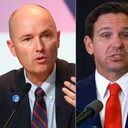False rumors of ICE raids spark panic in cities around U.S.
False rumors and panic have hit cities coast to coast after federal authorities began a nationwide immigration crackdown, prompting advocates and community leaders to warn people to seek reliable sources of information and keep calm.
Why it matters: Misinformation can ripple through already tense communities, leading to people staying home from work and school.
State of play: Within a couple days of the Trump administration announcing it would allow Immigration and Customs Enforcement officers to conduct enforcement in schools, a false report that ICE offers had showed up to a Chicago elementary school was shared in news reports and even by the governor.
- A similar rumor spread in Philadelphia, prompting the School District of Philadelphia, home to over 198,000 students, to release a statement denying that ICE had been in schools.
- In San Francisco, a middle schooler's claim she'd encountered an ICE agent on a city bus set off panic among parents and others in the city, per a report in the San Francisco Standard.
In immigrant communities in Colorado, online posts warning of raids spread quickly before local police stepped in, saying they were not aware of any action.
- And in Boston on Tuesday, leaders of the Boston Children's Hospital reassured the public that ICE had not raided the facility after several popular social media accounts reposted a false rumor.
What they're saying: "Misinformation is really dangerous because it creates panic and it creates chaos in any community, and immigrant communities are no different," says Conchita Cruz, co-executive director of the Asylum Seeker Advocacy Project (ASAP).
- "I think that part of what is so difficult about this moment for so many immigrants around the United States is that a lot of the executive orders, a lot of the policy changes that are being announced are really not clear."
Between the lines: Top Trump administration officials have made contradictory statements about whether ICE raids would target people with criminal records, or anyone in the country illegally.
- Immigration officials have also not offered specifics as to the circumstances under which they would attempt to arrest someone at a school, for example.
- Whether by design or not, that ambiguity is feeding into the climate of fear and confusion.







